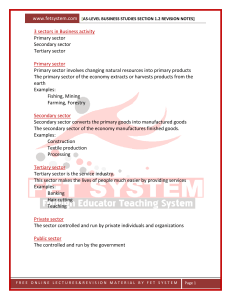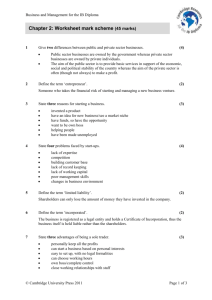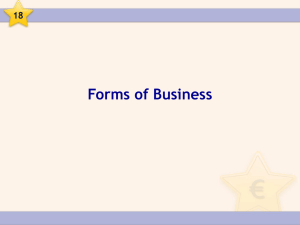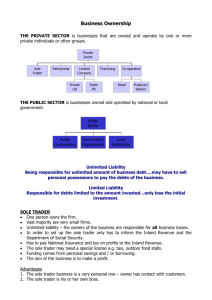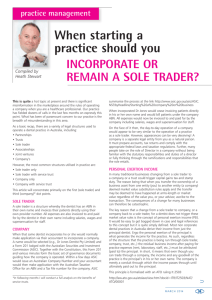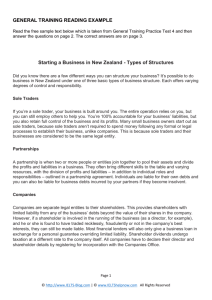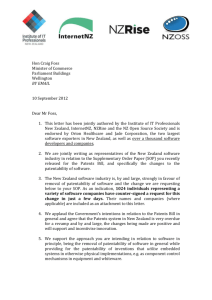business structure advice
advertisement
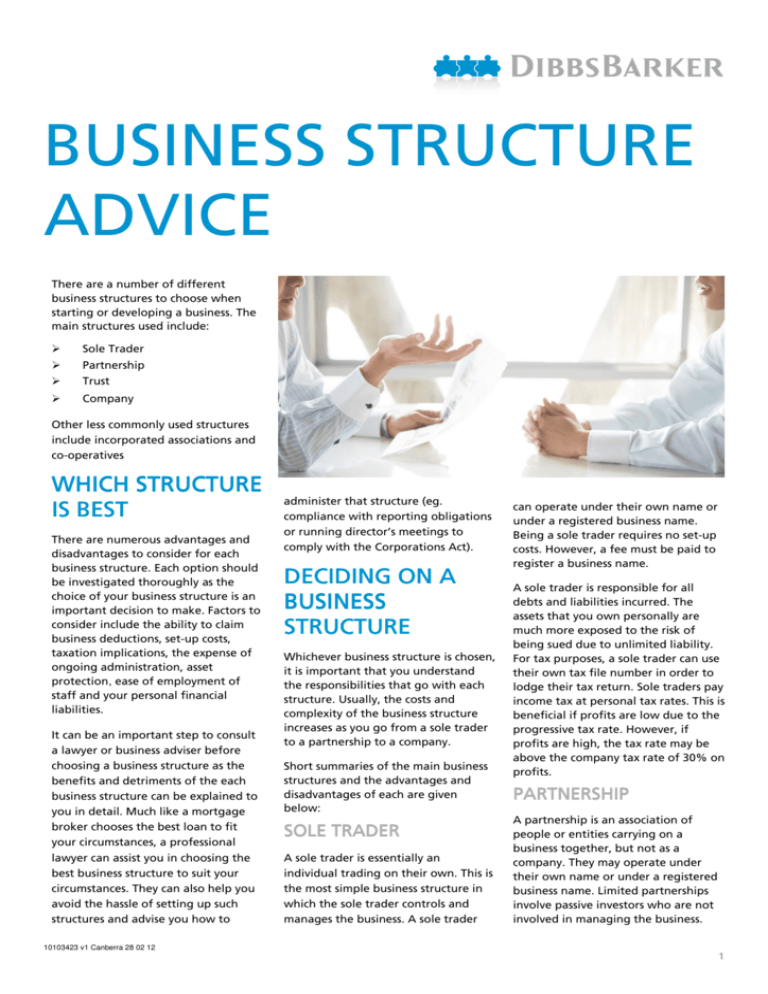
BUSINESS STRUCTURE ADVICE There are a number of different business structures to choose when starting or developing a business. The main structures used include: Sole Trader Partnership Trust Company Other less commonly used structures include incorporated associations and co-operatives WHICH STRUCTURE IS BEST There are numerous advantages and disadvantages to consider for each business structure. Each option should be investigated thoroughly as the choice of your business structure is an important decision to make. Factors to consider include the ability to claim business deductions, set-up costs, taxation implications, the expense of ongoing administration, asset protection, ease of employment of staff and your personal financial liabilities. It can be an important step to consult a lawyer or business adviser before choosing a business structure as the benefits and detriments of the each business structure can be explained to you in detail. Much like a mortgage broker chooses the best loan to fit your circumstances, a professional lawyer can assist you in choosing the best business structure to suit your circumstances. They can also help you avoid the hassle of setting up such structures and advise you how to administer that structure (eg. compliance with reporting obligations or running director’s meetings to comply with the Corporations Act). DECIDING ON A BUSINESS STRUCTURE Whichever business structure is chosen, it is important that you understand the responsibilities that go with each structure. Usually, the costs and complexity of the business structure increases as you go from a sole trader to a partnership to a company. Short summaries of the main business structures and the advantages and disadvantages of each are given below: SOLE TRADER A sole trader is essentially an individual trading on their own. This is the most simple business structure in which the sole trader controls and manages the business. A sole trader can operate under their own name or under a registered business name. Being a sole trader requires no set-up costs. However, a fee must be paid to register a business name. A sole trader is responsible for all debts and liabilities incurred. The assets that you own personally are much more exposed to the risk of being sued due to unlimited liability. For tax purposes, a sole trader can use their own tax file number in order to lodge their tax return. Sole traders pay income tax at personal tax rates. This is beneficial if profits are low due to the progressive tax rate. However, if profits are high, the tax rate may be above the company tax rate of 30% on profits. PARTNERSHIP A partnership is an association of people or entities carrying on a business together, but not as a company. They may operate under their own name or under a registered business name. Limited partnerships involve passive investors who are not involved in managing the business. 10103423 v1 Canberra 28 02 12 1 BUSINESS STRUCTURE ADVICE In a partnership, the profits earned are distributed to the partners, who then pay tax according to their own personal circumstances. Liability is also unlimited (unless you are in a limited partnership) and can include debts incurred by a partner without the knowledge or consent of the other partner. TRUST A Trust is an entity that holds property or income for the benefit of others. One of the most common types of trusts is a discretionary trust. For discretionary trusts, profits are distributed to the beneficiaries at the discretion of the trustees. This can have the benefit of minimising tax (eg. to beneficiaries in a lower tax bracket). Trusts give an increased level of asset protection when the trustee is a company that owns no assets. COMPANY A company is an independent legal entity separate from its shareholders. The shareholders own the company and the directors run the company. The directors of a company, as well as company employees, can also be shareholders. A company offers a much greater level of asset protection as your personal assets are separate from the business. However, major creditors often require directors of companies to personally guarantee the company’s liabilities. A company offers the benefits of a lower tax rate of 30% on profits where profits are high. A company can be set up as a proprietary limited or limited company depending on the circumstances of the BUSINESS NAMES A company can trade under its own name (eg. ABC Pty Ltd) or obtain and use a business name or both. DibbsBarker can register your business name on your behalf. If you plan to set up your business in more than one State, you need to register your business in each State and/or Territory. A Registered Office in that State or Territory is required in order for the business name to be registered. If your company does not have an Office in that State or Territory, DibbsBarker can act as Resident Agent for your business. This essentially involves your company utilising the offices of DibbsBarker as your Registered Office, without having to open your own office in that State or Territory. After the business name is registered you can then operate under that business name in that State or Territory. WHAT WE CAN DO FOR MORE INFORMATION John Hill Partner T 61 2 6201 7200 F 61 2 6257 4011 John.hill@dibbsbarker.com John.hill@dibbsbarker.com John Buxton Partner T 61 2 6201 7260 F 61 2 6257 4011 john.buxton@dibbsbarker.com BRISBANE Level 22 Central Plaza 2 66 Eagle Street Brisbane QLD 4000 GPO Box 67 Brisbane QLD 4001 T 61 7 3100 5000 F 61 7 3100 5001 SYDNEY Level 8 Angel Place 123 Pitt Street Sydney NSW 2000 GPO Box 983 Sydney NSW 2001 DX 101 Sydney T 61 2 8233 9500 F 61 2 8233 9555 CANBERRA Level 6 Canberra House 40 Marcus Clarke Street Canberra ACT 2600 Unit 6, 169 Newcastle Street Our experienced DibbsBarker lawyers can consult with you to determine the best structure for your business and assist you in setting up that structure. We have lawyers who are experienced in providing advice specific to the circumstances of your business and we are committed to ensuring that you obtain the outcomes you desire. We can also set up discretionary (or family) trusts, unit trusts, company constitutions and employment contracts specific to your business. Fyshwick ACT 2609 GPO Box 819 Canberra ACT 2601 DX 5614 Canberra T 61 2 6201 7222 F 61 2 6257 4011 www.dibbsbarker.com 10103423 v1 Canberra 28 02 12 2
